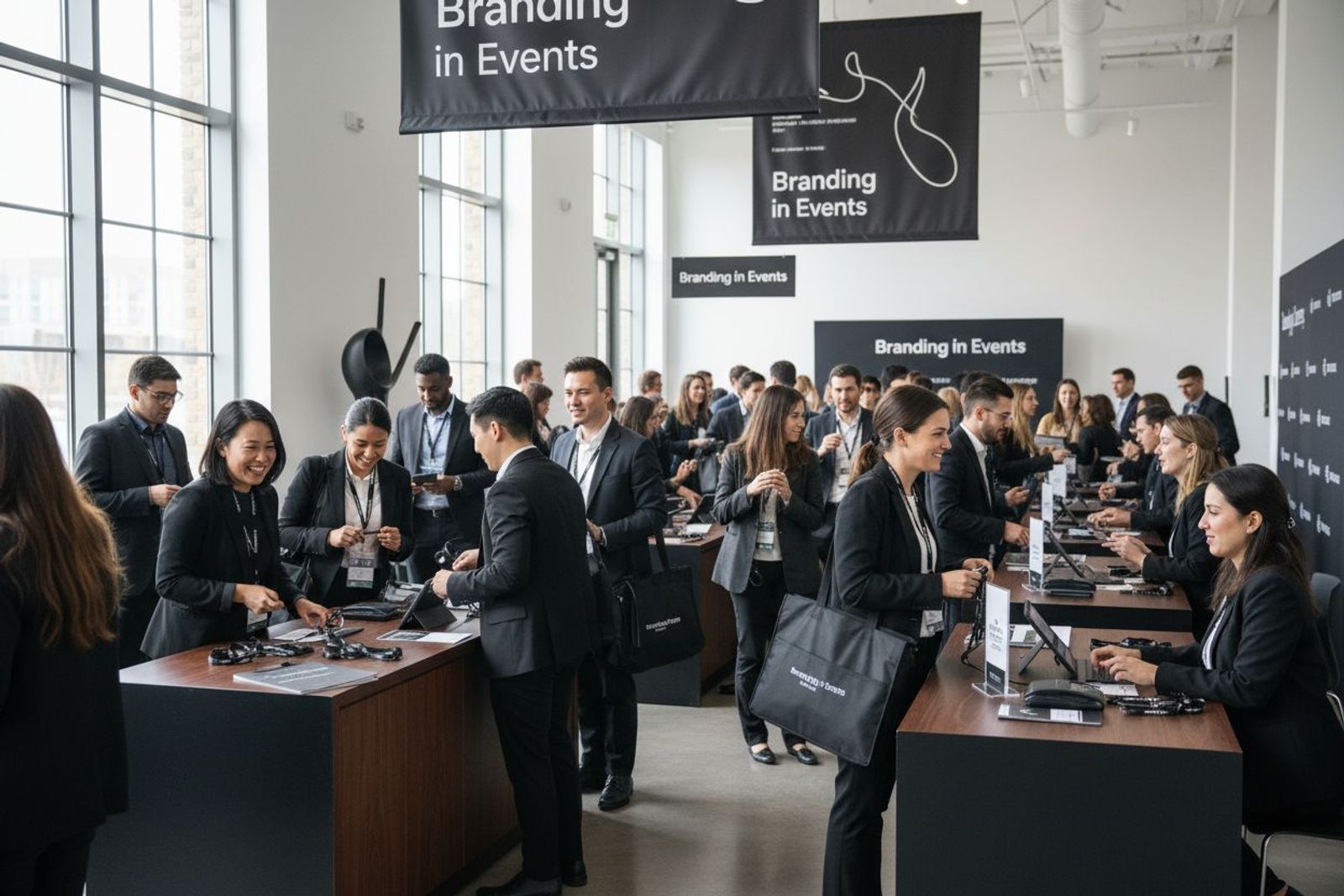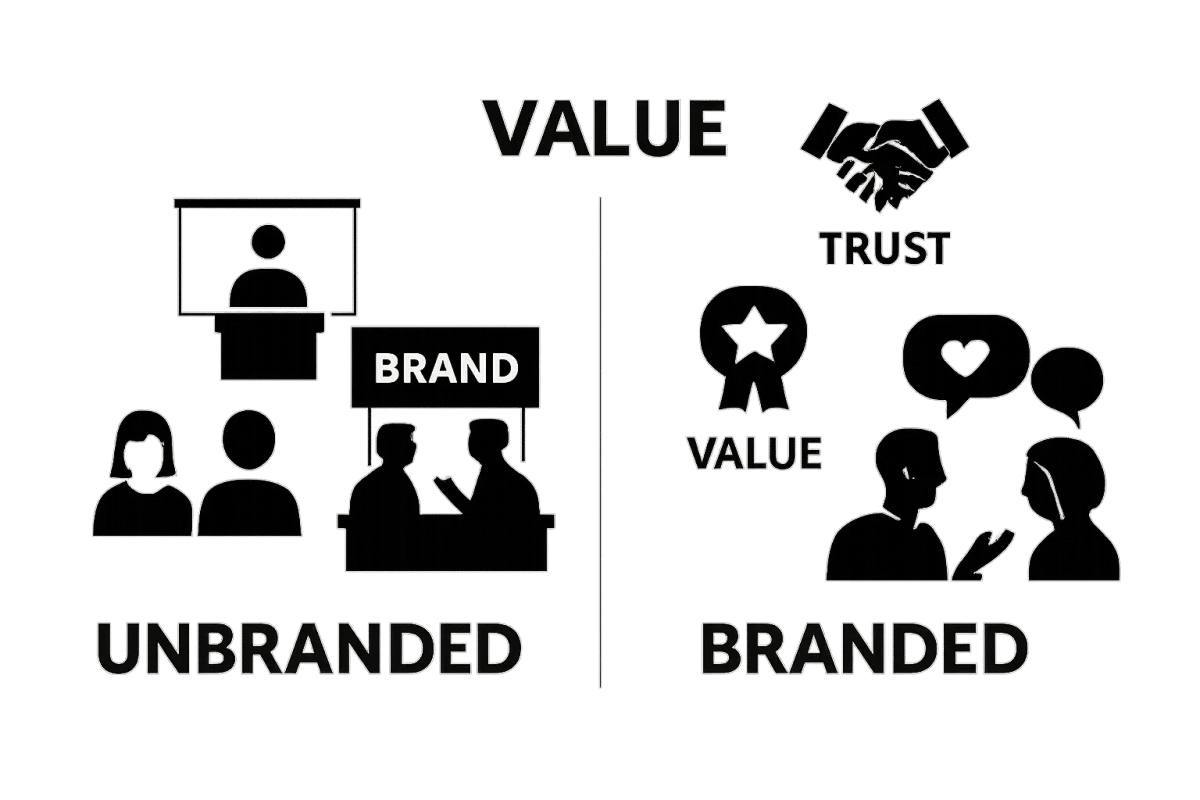Professional Bar Trivia SoftwareFor Venues & Events
- Players join via QR code — no app download
- 6 round types: Buzzer Race, Everyone Answers & more
- Rich media questions with images, video & audio
- Real-time scoring & leaderboards on the big screen
Understanding the Role of Branding in Events
October 3, 2025

Branding shapes every detail of an event and one study found that organizations with strong event branding boost attendee engagement by up to 65 percent. That number might sound big, but looks can be deceiving. Most people think branding is just about logos or signs, but the real power comes from emotional connections and unforgettable experiences—a strategy that turns casual visitors into lifelong fans.
Table of Contents
- Defining Branding And Its Importance In Events
- The Impact Of Branding On Event Perception
- Branding Strategies For Effective Event Engagement
- Measuring The Success Of Branding In Events
- Case Studies: Successful Branding In Major Events
Quick Summary
| Takeaway | Explanation |
|---|---|
| Branding is more than visuals | Effective branding creates emotional connections and reflects organizational values. |
| Create a cohesive brand narrative | Storytelling enhances engagement; a clear narrative boosts attendee involvement significantly. |
| Integrate technology in branding | Leveraging digital tools enhances personalization and engagement for a memorable experience. |
| Measure branding effectiveness holistically | Combine quantitative metrics with qualitative insights to assess branding impact comprehensively. |
| Establish consistency in messaging | Consistent messaging reinforces credibility and sets clear expectations for attendees. |
Defining Branding and Its Importance in Events
Branding goes far beyond a simple logo or visual design. In the context of events, it represents a comprehensive strategy that communicates an organization's identity, values, and unique positioning through every interaction and experience. Learn more about custom branding techniques to understand how powerful this concept truly is.
The Essence of Event Branding
Event branding is a strategic approach that transforms a standard gathering into a memorable and meaningful experience. According to research published in the Event Management journal, effective branding helps establish an emotional connection with participants, making events more impactful and resonant.
Key characteristics of successful event branding include:
- Creating a cohesive visual and narrative identity
- Ensuring consistent messaging across all event touchpoints
- Developing a unique atmosphere that reflects organizational values
Why Branding Matters in Event Experiences
Branding serves multiple critical functions in event management. It helps differentiate an event from competitors, builds anticipation, and creates a lasting impression that extends beyond the actual event duration.
Emotional engagement is the core outcome of strategic event branding.
Organizations invest in event branding because it:

- Builds credibility and trust with attendees
- Enhances perceived value of the event experience
- Creates memorable moments that participants will discuss long after the event concludes
By thoughtfully integrating branding elements into every aspect of an event, organizations can transform a simple gathering into a powerful communication tool that reinforces their broader strategic objectives.
The Impact of Branding on Event Perception
Event branding transcends visual aesthetics and enters the realm of psychological perception and emotional connection. Explore our interactive branding strategies to understand how subtle design elements can dramatically transform participant experiences.
Psychological Dimensions of Event Branding
Perception is a complex cognitive process where attendees interpret and assign meaning to event experiences. Research from tourism and event management studies demonstrates that strategic branding significantly influences how participants emotionally and intellectually process an event.
Key psychological triggers in event branding include:
- Creating sensory experiences that align with brand narrative
- Establishing immediate emotional resonance
- Building anticipatory excitement before the actual event
Cognitive and Emotional Branding Mechanisms
Branding operates through multiple interconnected mechanisms that shape participant expectations and interpretations. Cognitive processing occurs when attendees decode visual and experiential signals, while emotional engagement determines the lasting impact of these signals.
Critical branding perception factors include:
- Consistency between promised experience and actual delivery
- Authenticity of brand messaging
- Unique differentiation from competing events
Events that masterfully integrate branding transform from mere gatherings into powerful narrative experiences. By carefully curating every touchpoint, organizations can create profound connections that resonate far beyond the event's immediate duration, turning participants into long-term brand advocates.
Branding Strategies for Effective Event Engagement
Event branding requires a strategic, multifaceted approach that transforms passive participation into active engagement. Explore game show formats for interactive event experiences to understand how innovative strategies can revolutionize audience interaction.
Crafting a Cohesive Brand Narrative
Successful event branding is fundamentally about storytelling. According to marketing research from EventBrite, organizations that develop a compelling narrative framework can increase attendee engagement by up to 65%.
Key elements of a powerful brand narrative include:
- Establishing a clear and authentic brand voice
- Creating emotional connection points
- Developing consistent messaging across all event touchpoints
Strategic Visual and Experiential Alignment
Branding extends beyond visual design to encompass the entire event experience. Strategic alignment means ensuring that every interaction reinforces the organization's core values and unique identity.
Critical strategies for experiential branding include:
- Designing immersive environmental experiences
- Integrating interactive technological elements
- Personalizing attendee interactions
By thoughtfully integrating branding across multiple sensory and experiential dimensions, organizations can transform events from simple gatherings into memorable, transformative experiences that resonate deeply with participants and create lasting brand impressions.

Measuring the Success of Branding in Events
Measuring event branding effectiveness requires a comprehensive approach that goes beyond traditional metrics. Learn more about defining team building success to understand the nuanced evaluation strategies that provide meaningful insights.
Quantitative Branding Performance Indicators
Numeric measurements provide concrete evidence of branding impact. According to event marketing research from Bizzabo, organizations that systematically track branding metrics see a 27% improvement in event perceived value.
Key quantitative metrics include:
- Attendee registration and conversion rates
- Social media engagement and reach
- Post-event survey satisfaction scores
Qualitative Assessment of Brand Experience
Beyond numbers, emotional resonance plays a critical role in understanding branding success. Qualitative measurements capture the subtle yet profound ways an event's branding influences participant perceptions.
Critical qualitative evaluation methods involve:
- In-depth participant interviews
- Sentiment analysis of social media conversations
- Analyzing narrative feedback and testimonials
Comprehensive branding success measurement requires integrating both quantitative data and qualitative insights. By developing a holistic evaluation framework, organizations can understand not just the immediate impact of their event branding, but also its long-term strategic value in building meaningful connections with their audience.
The table below summarizes the key quantitative and qualitative metrics discussed in the article for evaluating event branding success.
| Measurement Type | Example Metrics/Methods | Explanation |
|---|---|---|
| Quantitative | Attendee registration and conversion rates | Track actual participation numbers and growth |
| Quantitative | Social media engagement and reach | Measure online attention and sharing |
| Quantitative | Post-event survey satisfaction scores | Assess direct participant feedback numerically |
| Qualitative | In-depth participant interviews | Gain detailed insights into attendee perceptions |
| Qualitative | Sentiment analysis of social media conversations | Understand emotional tone around the event |
| Qualitative | Narrative feedback and testimonials | Capture personal stories and the lasting emotional impact |
Case Studies: Successful Branding in Major Events
Event branding excellence transforms ordinary gatherings into extraordinary experiences that resonate globally. Discover interactive strategies for engaging event experiences to understand how innovative approaches create memorable moments.
Global Mega Event Branding Strategies
The Olympic Games represent the pinnacle of strategic event branding. According to the Olympic Organization, their branding transcends visual design, creating a universal language of unity, aspiration, and human potential.
Key characteristics of successful mega event branding include:
- Creating a consistent visual narrative
- Developing universal emotional connection points
- Integrating cultural diversity while maintaining core brand identity
Technology and Innovative Branding Approaches
Digital transformation has revolutionized event branding, enabling unprecedented levels of personalization and interaction. Successful events now leverage technology to create immersive, interconnected experiences that extend far beyond physical boundaries.
Innovative branding techniques demonstrate:
- Real-time audience engagement mechanisms
- Personalized digital interaction platforms
- Seamless integration of physical and virtual event experiences
These case studies reveal that exceptional event branding is not about perfection, but about creating genuine, memorable connections that inspire, engage, and transform participant experiences.
Elevate Your Event Branding With Interactive Engagement
Are you struggling to turn your carefully crafted event branding into real emotional connections and memorable participant experiences? The article clearly highlights how branding must move beyond visuals to offer authentic interaction and meaningful engagement. Many organizations want a unique atmosphere and seamless brand integration, but find it tough to link their identity to every event touchpoint in a way that attendees truly remember.

Quizado empowers you to bridge this gap. With customizable quiz games inspired by iconic shows like Family Feud, you can effortlessly reinforce your brand throughout the team-building experience. Upload your own logos, curate quiz content, and align visuals with your event's story for a cohesive presence. Choose from over 150 survey questions or add your own, ensuring every detail matches your organization's voice. See how custom branding techniques in our software create memorable moments that keep teams connected long after the event.
Ready to turn your next branded event into a standout interactive experience? Visit Quizado.com now and start crafting engagement that lasts.
Frequently Asked Questions
What is event branding and why is it important?
Event branding is a strategic approach that transforms gatherings into memorable experiences by communicating an organization's identity and values. It is important because it helps differentiate an event from competitors, builds anticipation, and creates lasting impressions.
How does branding influence participant experiences at events?
Branding influences participant experiences by establishing emotional connections and enhancing perceived value. Effective branding creates a cohesive narrative and atmosphere, engaging attendees on both cognitive and emotional levels.
What are some strategies for effective event branding?
Effective event branding strategies include crafting a cohesive brand narrative, ensuring visual and experiential alignment, and personalizing attendee interactions. These elements help create immersive experiences that resonate with participants.
How can organizations measure the success of their event branding efforts?
Organizations can measure event branding success through quantitative metrics like registration rates and social media engagement, as well as qualitative assessments such as participant interviews and sentiment analysis to evaluate emotional resonance.
Recommended
What's next?
Start Hosting Bar Trivia Tonight
Try Quizado free — no download needed. Host your first trivia night tonight!

